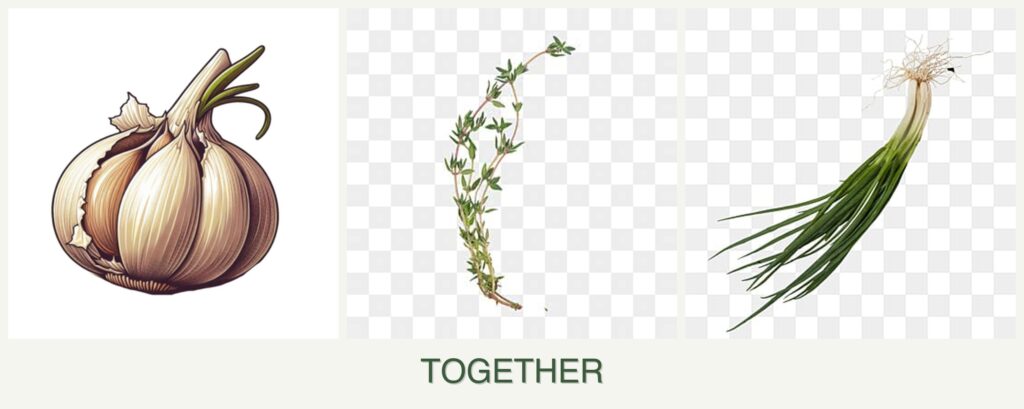
Can you plant garlic, thyme and chives together?
Can You Plant Garlic, Thyme, and Chives Together?
Companion planting is a popular technique among gardeners seeking to maximize the health and productivity of their gardens. By strategically pairing certain plants, you can enhance growth, deter pests, and improve flavor. In this article, we’ll explore whether garlic, thyme, and chives can be successfully planted together, examining their compatibility and offering practical gardening tips.
Compatibility Analysis
Yes, you can plant garlic, thyme, and chives together. These three plants are compatible due to their similar growth requirements and complementary characteristics. Garlic is known for its natural pest-repellent properties, which can benefit thyme and chives. All three herbs thrive in similar conditions, making them suitable companions in a garden setting.
Key Factors:
- Growth Requirements: Garlic, thyme, and chives prefer full sun and well-drained soil. They can tolerate a range of soil types but thrive best in slightly alkaline to neutral pH levels.
- Pest Control: Garlic acts as a natural insect repellent, helping to protect thyme and chives from common garden pests.
- Nutrient Needs: These herbs have moderate nutrient requirements and can coexist without competing heavily for resources.
- Spacing: Proper spacing is crucial to ensure each plant receives adequate sunlight and airflow, reducing the risk of disease.
Growing Requirements Comparison Table
| Plant | Sunlight Needs | Water Requirements | Soil pH | Soil Type | Hardiness Zones | Spacing Requirements | Growth Habit |
|---|---|---|---|---|---|---|---|
| Garlic | Full sun | Moderate | 6.0-7.0 | Well-drained | 3-8 | 4-6 inches | Bulbous, 18-24" |
| Thyme | Full sun | Low | 6.0-8.0 | Sandy, loamy | 5-9 | 12-18 inches | Low, spreading |
| Chives | Full sun | Moderate | 6.0-7.0 | Loamy | 3-9 | 8-12 inches | Upright, 12-18" |
Benefits of Planting Together
- Pest Repellent Properties: Garlic’s strong aroma deters aphids and other pests, benefiting thyme and chives.
- Improved Flavor: The proximity of these herbs can enhance their flavors, particularly thyme and chives.
- Space Efficiency: Planting these herbs together maximizes garden space, allowing for a more diverse herb garden.
- Soil Health: Garlic’s sulfur compounds can improve soil health, benefiting neighboring plants.
- Pollinator Attraction: Chives’ flowers attract pollinators, supporting a healthy garden ecosystem.
Potential Challenges
- Competition for Resources: Although these plants have similar needs, ensure adequate spacing to prevent competition.
- Different Watering Needs: Thyme requires less water than garlic and chives, so careful watering is essential.
- Disease Susceptibility: Overcrowding can lead to fungal diseases; maintain proper airflow.
- Harvesting Considerations: Plan for staggered harvesting to avoid disturbing neighboring plants.
Practical Solutions:
- Use drip irrigation to manage different watering needs.
- Mulch to retain soil moisture and suppress weeds.
- Rotate planting locations each season to prevent soil nutrient depletion.
Planting Tips & Best Practices
- Optimal Spacing: Plant garlic cloves 4-6 inches apart, thyme 12-18 inches apart, and chives 8-12 inches apart.
- When to Plant: Plant garlic in the fall for a summer harvest. Thyme and chives can be planted in spring after the last frost.
- Container vs. Garden Bed: All three herbs can be grown in containers or garden beds. Ensure containers have good drainage.
- Soil Preparation: Amend soil with compost to improve drainage and fertility.
- Companion Plants: Consider adding marigolds or basil, which pair well with these herbs and further deter pests.
FAQ Section
-
Can you plant garlic and thyme in the same pot?
- Yes, ensure the pot is large enough and has good drainage.
-
How far apart should garlic and chives be planted?
- Plant garlic 4-6 inches apart and chives 8-12 inches apart.
-
Do garlic and thyme need the same amount of water?
- Garlic needs moderate water, while thyme prefers less. Adjust watering accordingly.
-
What should not be planted with garlic, thyme, and chives?
- Avoid planting with legumes, as garlic can inhibit their growth.
-
Will garlic affect the taste of thyme?
- Garlic can enhance the flavor of thyme without negatively affecting it.
-
When is the best time to plant these herbs together?
- Plant garlic in the fall and thyme and chives in spring for optimal growth.
By understanding the compatibility and requirements of garlic, thyme, and chives, gardeners can create a thriving herb garden. These herbs not only complement each other in the garden but also enhance the culinary experience in the kitchen.


Leave a Reply